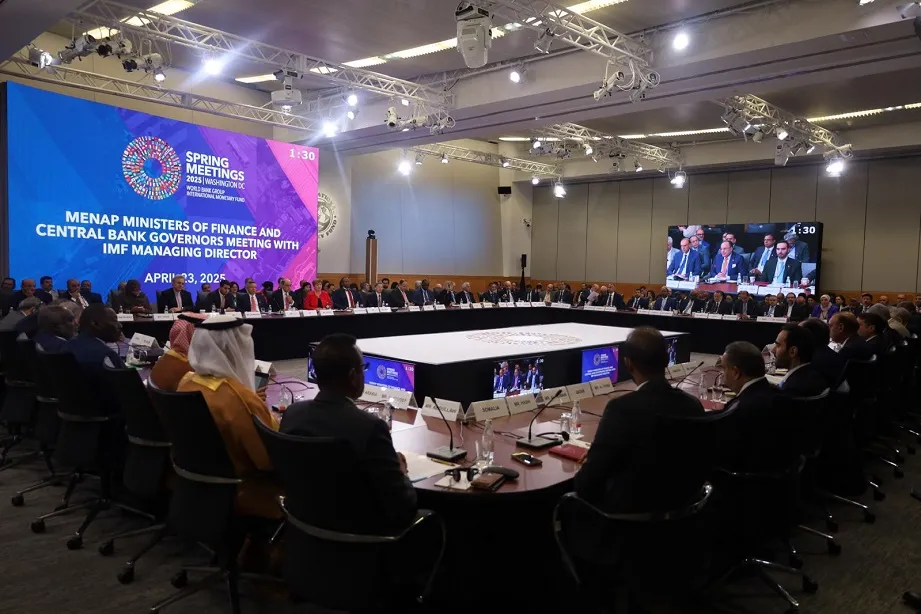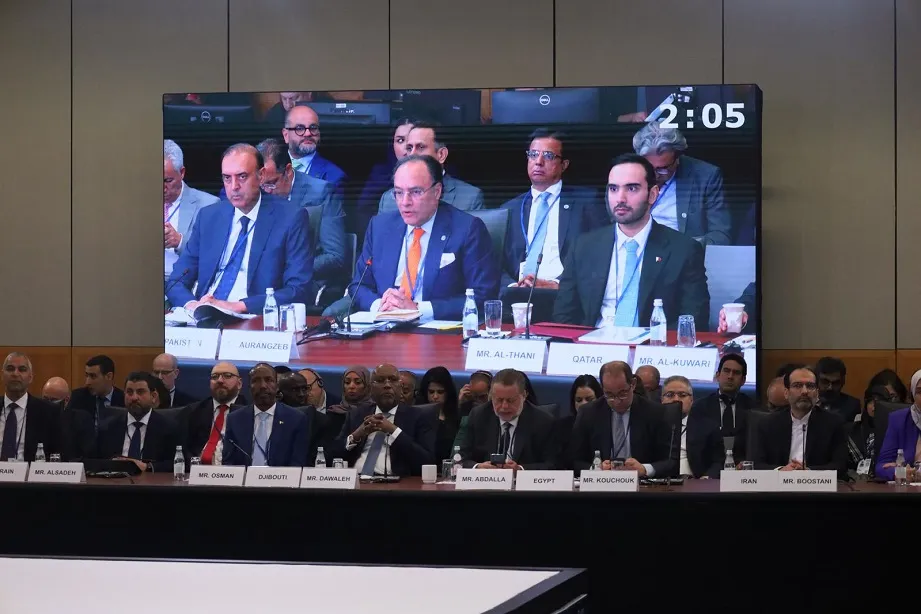Washington/Islamabad: Finance Minister Senator Muhammad Aurangzeb wrapped up the third day of his visit to Washington, D.C., where he participated in the annual spring meetings of the International Monetary Fund (IMF) and the World Bank.
His engagements throughout the day were focused on advancing Pakistan’s economic agenda, fostering international partnerships, and attracting investment to key sectors such as climate finance, financial inclusion, and cryptocurrencies.
Strengthening Ties with China
One of the key meetings was with H.E. Lan Fo’an, the Finance Minister of China. Minister Aurangzeb reflected on their productive discussions during their previous meeting in Beijing in July 2024, expressing gratitude for China’s continuous support for Pakistan’s socio-economic development.
He updated the Chinese minister on Pakistan’s ongoing reforms in sectors such as taxation, energy, privatization, public finance, and State-Owned Enterprises (SOEs).
Minister Aurangzeb specifically sought China’s assistance in expediting the issuance of Panda bonds and extended an invitation for the Chinese Finance Minister to visit Pakistan.
Engagement with Saudi Arabia
Later, the Finance Minister met with H.E. Mohammed Aljadaan, the Saudi Minister of Finance, and thanked Saudi Arabia for its ongoing support of Pakistan’s economic stability, especially in relation to the IMF’s Extended Fund Facility (EFF) program.
Minister Aurangzeb welcomed Saudi investments in Pakistan and reaffirmed the government’s commitment to long-term reforms. He also invited the Saudi Finance Minister to visit Pakistan to explore additional areas of collaboration.
Financial Inclusion and Empowerment of Women
Minister Aurangzeb also met Her Majesty Queen Máxima of the Netherlands, who is a global advocate for financial inclusion.
The two discussed Pakistan’s efforts to enhance financial inclusion, particularly for women. Minister Aurangzeb provided updates on the National Financial Inclusion Strategy, which aims to improve digital access, entrepreneurship, and education for women in Pakistan.
He emphasized the importance of cross-entity data sharing to promote more inclusive financial systems and ensure women are not left behind in the digital financial landscape.
Strengthening Ties with Turkey and the UAE
Further meetings included discussions with H.E. Mehmet Şimşek, Turkey’s Finance Minister.
The ministers discussed the historical and strategic ties between Pakistan and Turkey, as well as the potential for deeper trade and investment, particularly in Pakistan’s dairy, cheese, and livestock sectors. Minister Aurangzeb encouraged Turkish investors to explore business opportunities in these areas.
With H.E. Mohamed Bin Hadi Alm Hussaini, UAE’s Minister of State for Financial Affairs, the Finance Minister highlighted recent developments in Pakistan’s economic indicators, including the upgrade in Pakistan’s sovereign rating by Fitch.
Read More: IMF Reduces Pakistan GDP Growth Projection to 2.6%
They also discussed Pakistan’s ongoing privatization agenda and the need for turning memoranda of understanding (MoUs) into concrete investment agreements.
Aurangzeb also sought the UAE’s expertise in regulating cryptocurrency markets, emphasizing Pakistan’s interest in adopting best practices from the UAE’s experience.
Climate Finance and Resilience
A central part of Minister Aurangzeb’s trip was his participation in the 13th Ministerial Meeting of the Coalition of Finance Ministers for Climate Action (CFMCA).
In his statement, he outlined Pakistan’s development of a Climate Prosperity Plan (CPP) and a Climate Finance Strategy aimed at addressing climate resilience and decarbonization.
Aurangzeb highlighted the importance of integrating climate considerations into Pakistan’s macroeconomic policies and noted that the country had reached a Staff Level Agreement (SLA) with the IMF under the Resilience and Sustainability Facility (RSF) to support long-term balance of payments stability amid climate challenges.
Engagements with International Organizations
In addition to his bilateral meetings, the Finance Minister participated in discussions with global organizations.
At a meeting with IMF Managing Director Ms. Kristalina Georgieva, Minister Aurangzeb emphasized the importance of structural reforms in areas such as taxation, energy, privatization, and SOE rightsizing.
He also pointed out that Pakistan’s recent Fitch credit rating upgrade was a sign of the country’s positive reform trajectory.
Gates Foundation
Furthermore, in a meeting with Ms. Gargee Ghosh, President of Global Policy and Advocacy at the Gates Foundation, Minister Aurangzeb expressed gratitude for the Foundation’s efforts in Pakistan, particularly in the areas of polio eradication, maternal and child health, and nutrition.
He also highlighted the Foundation’s contribution to Pakistan’s tax system digitization and discussed the integration of Buna and Raast payment platforms to support financial inclusion.
Discussions on Infrastructure Development
Minister Aurangzeb also met with Mr. Jin Liqun, President of the Asian Infrastructure Investment Bank (AIIB), to discuss ongoing and future projects in Pakistan.
Aurangzeb thanked the AIIB for its support and reiterated Pakistan’s desire to issue its inaugural Panda bond later this year.
Read More: Finance Minister Departs for US to Attend WB IMF Spring Meetings
He expressed confidence that the ongoing engagements with the AIIB would further strengthen Pakistan’s economic development.
In a meeting with S&P Global officials, the Finance Minister welcomed their upcoming visit to Pakistan.

He briefed them on Pakistan’s macroeconomic outlook, fiscal consolidation efforts, and key growth sectors, stressing the importance of the recent credit rating upgrade by Fitch as a step forward for Pakistan’s reform agenda.
Aurangzeb expressed hope that S&P Global would also consider upgrading Pakistan’s sovereign ratings.
Fireside Chat and Closing Remarks
Earlier in the day, Minister Aurangzeb participated in a fireside chat hosted by Mr. Masood Ahmed, President Emeritus of the Center for Global Development.
During the session, he reiterated Pakistan’s commitment to structural reforms and sustainable economic growth.
The event concluded with a Q&A session, allowing participants to engage with the Finance Minister on Pakistan’s economic priorities and challenges.
Minister Aurangzeb’s visit to Washington, D.C., represents a significant step in Pakistan’s efforts to strengthen its international economic partnerships and promote its reform agenda on the global stage.
Also Read: Pakistan Seeks Enhanced Imports and Investment from US, Finance Minister
Through his meetings with key leaders from China, Saudi Arabia, Turkey, the UAE, and international organizations, Aurangzeb has worked to build momentum for economic reforms, attract foreign investment, and position Pakistan as a leader in climate finance and financial inclusion.
His proactive engagements with global stakeholders underscore Pakistan’s ambition to address both short-term economic challenges and long-term development goals, ensuring that the country remains on a path to sustained economic growth. Story by AHmed Mukhtar.









